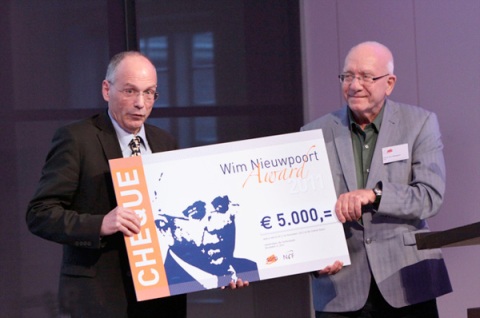Groningen winner and nominees for Wim Nieuwpoort Award
On December 9, the Wim Nieuwpoort Award 2011 was granted to Prof. Hans De Raedt (Computational Physics — Zernike Institute for Advanced Materials) for the proposal ‘Massively Parallel Quantum Dynamics Simulator’. The Wim Nieuwpoort award is meant for Dutch research teams that have demonstrated to be able to efficiently run scientific applications on a significant part of a large Dutch national HPC system. De Raedt was granted the Award for his proposal ‘Massively Parallel Quantum Dynamics Simulator’.
Besides De Raedt, two other researchers of the Groningen Faculty of Science and Engineering (formerly known as the Faculty of Mathematics and Natural Sciences) were nominated: Prof. Elisabetta Pallante (High Energy Physics — Theoretical Physics) and Dr.ir. Roel Verstappen (Engineering Mechanics and Numerical Mathematics — Johann Bernoulli Institute) .

The award consists of a sum of 5,000 euros and a visit to SC12, the annual supercomputing and communications conference in November 2012 in the U.S. At this conference the winner is offered the opportunity to present the research and scalability results in the Dutch Research Consortium booth.
The award has been named after Emeritus Professor Wim Nieuwpoort who has had great influence on the promotion of large-scale computing in the Netherlands.
More news
-
19 December 2025
Mariano Méndez receives Argentine RAÍCES award
-
18 December 2025
Why innovate, and for whom?
-
17 December 2025
Ben Feringa wins Feynman Prize
